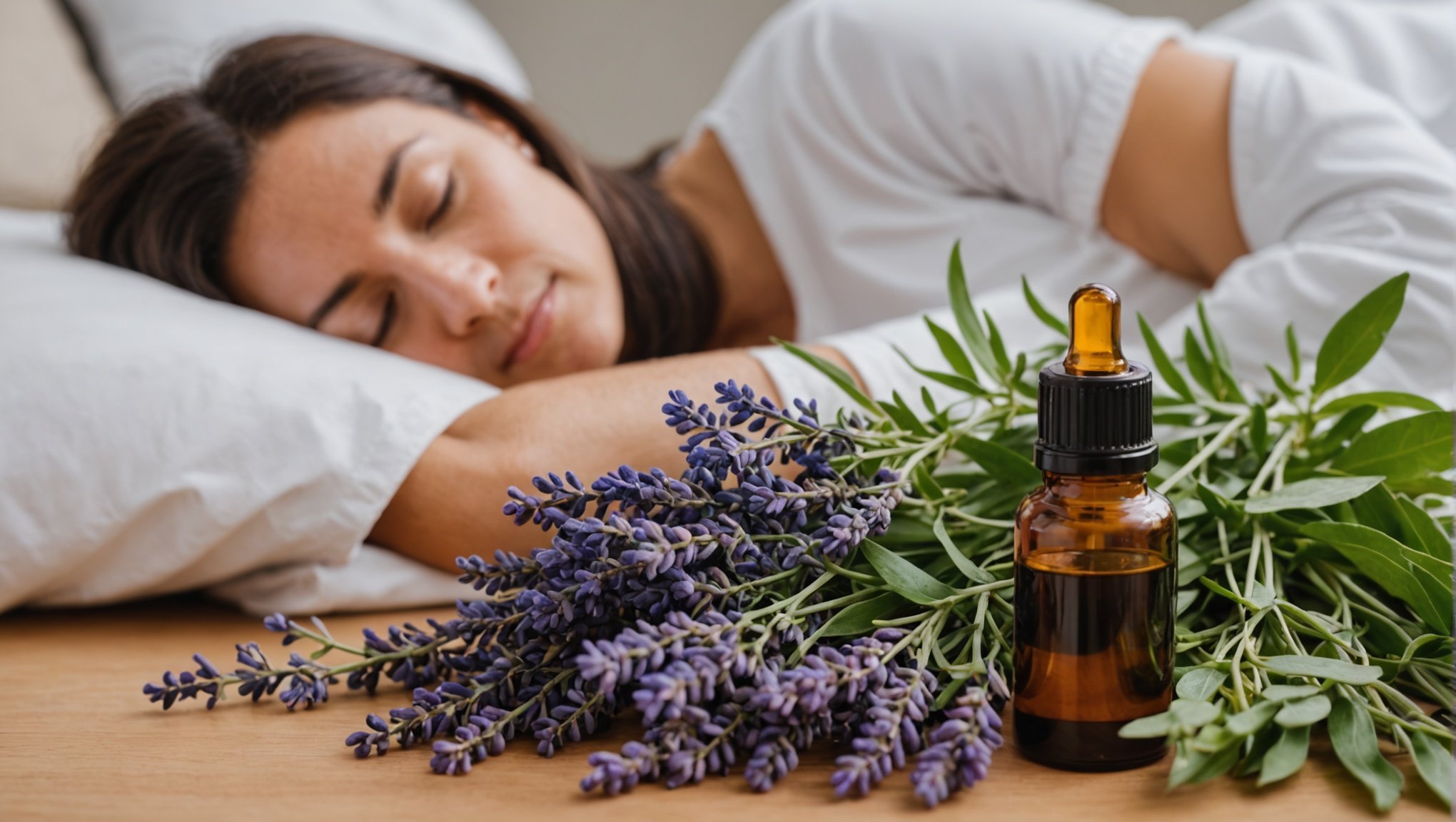Shift workers often face unique challenges when it comes to sleep, leading to fatigue and health issues. Aromatherapy offers a natural and effective solution to help improve sleep quality for those on irregular schedules. By harnessing the power of essential oils, shift workers can create a calming environment that promotes relaxation and restful sleep. Discover how specific scents can combat insomnia and enhance well-being, providing the much-needed support for busy lifestyles. Embrace the potential of aromatherapy to unlock better sleep and restore balance in your life.
Understanding Sleep Disorders in Shift Workers
Shift workers often face unique challenges when it comes to maintaining healthy sleep patterns. Sleep disorders are prevalent among this group, with shift work sleep disorder and insomnia being the most common. These disorders can severely impact an individual's well-being and productivity.
Also read : Overcoming Fear: How Cognitive Behavioral Therapy Can Help Cancer Survivors Tackle Recurrence Anxiety
Shift work sleep disorder is characterized by excessive sleepiness during work hours and insomnia during sleep hours. This misalignment between the body's internal clock and the external environment leads to difficulties in falling asleep, staying asleep, or obtaining restful sleep. Insomnia, on the other hand, manifests as persistent trouble in initiating or maintaining sleep, often resulting in non-restorative sleep and daytime fatigue.
The symptoms of these sleep disorders can be debilitating. They include chronic fatigue, irritability, difficulty concentrating, and increased risk of accidents. Over time, untreated sleep disorders can lead to more severe health issues such as cardiovascular diseases, gastrointestinal problems, and mental health disorders.
This might interest you : Unlocking Calm: The Power of Targeted Breathing Methods in Easing Panic Disorder Symptoms
Irregular work hours inherent in shift work disrupt the natural sleep-wake cycle, making it challenging for the body to maintain regular sleep patterns. This disruption affects sleep quality, leading to insufficient restorative sleep. Understanding these challenges is crucial in developing strategies to mitigate the adverse effects of shift work on sleep health.
Principles of Aromatherapy
Aromatherapy, a form of holistic healing, utilises essential oils to promote physical and emotional well-being. This practice dates back thousands of years, with ancient civilizations like the Egyptians and Greeks harnessing the power of plant extracts. Today, it remains a popular complementary therapy, particularly for those seeking natural remedies for stress and sleep disorders.
The effectiveness of aromatherapy lies in its ability to engage the olfactory system, which directly impacts the brain. When inhaled, essential oils stimulate the limbic system—a complex network responsible for emotions and memory. This interaction can lead to physiological changes, such as reduced heart rate and improved mood, fostering a sense of calm and relaxation.
Essential oils play a crucial role in influencing sleep and relaxation. Oils like lavender and chamomile are renowned for their soothing properties, often used to alleviate insomnia and promote restful sleep. The scent of these oils can signal the body to unwind, making them a valuable tool for shift workers struggling with sleep disorders. By integrating aromatherapy into their routine, individuals may find relief from the disruptive effects of irregular work hours, enhancing both sleep quality and overall well-being.
Essential Oils for Sleep Improvement
Exploring the world of essential oils for sleep can be a game-changer for those struggling to find rest. Among the most effective are lavender, chamomile, and bergamot, each offering unique benefits to enhance sleep quality.
Top Essential Oils for Sleep
- Lavender: Known for its calming effects, lavender is a popular choice for promoting relaxation and reducing anxiety. It can help improve sleep onset and duration, making it a staple in many nighttime routines.
- Chamomile: Often consumed as a tea, chamomile essential oil also aids in sleep by soothing the nervous system. Its gentle, sedative properties make it ideal for those experiencing insomnia or restlessness.
- Bergamot: Unlike other citrus oils, bergamot is calming rather than stimulating. It helps reduce stress and anxiety, creating a peaceful environment conducive to sleep.
Choosing High-Quality Essential Oils
When selecting essential oils for sleep, quality is paramount. Look for oils that are 100% pure, without additives or synthetic fragrances. Opt for reputable brands that provide information on the oil's origin and extraction process. This ensures you receive the full therapeutic benefits, allowing you to enjoy a restful night's sleep.
Methods of Application
Exploring various aromatherapy methods can significantly enhance the effectiveness of essential oils for sleep improvement. Among the most popular techniques are diffusers, topical application, and incorporating oils into a bath routine.
Diffusing essential oils is a simple and effective method to disperse their calming properties throughout a room. By adding a few drops of oil to a diffuser, you can create a serene atmosphere conducive to sleep. This method is particularly beneficial for those who prefer a continuous release of aroma overnight.
Topical application involves diluting essential oils with a carrier oil, such as coconut or jojoba, and applying them to the skin. Key areas include the wrists, temples, and the soles of the feet. This method allows the oils to be absorbed directly into the bloodstream, promoting relaxation.
Incorporating essential oils into a bath can also be a soothing ritual. Adding a few drops to warm bathwater can create a tranquil environment, helping to unwind after a long day.
When using essential oils, safety is paramount. Always perform a patch test before topical application to check for allergies. Additionally, ensure proper dilution to prevent skin irritation. These precautions will help ensure a safe and restorative aromatherapy experience.
Evidence-Based Research on Aromatherapy and Sleep
Scientific research studies have explored the effectiveness of aromatherapy in enhancing sleep quality, particularly for those experiencing sleep disruptions. Numerous studies indicate that essential oils, like lavender and chamomile, can significantly improve sleep by reducing anxiety and promoting relaxation. For instance, a study published in the Journal of Alternative and Complementary Medicine found that participants who inhaled lavender oil reported better sleep quality and increased sleep duration compared to those who did not.
The implications of these findings are particularly relevant for shift workers, who often struggle with irregular sleep patterns. Aromatherapy provides a non-invasive and natural solution, offering potential relief from the adverse effects of shift work on sleep. By integrating essential oils into their routine, shift workers may experience improved sleep quality and overall well-being.
However, while the benefits of aromatherapy are promising, there are limitations to the current body of research. Many studies have small sample sizes or lack long-term follow-up, which can affect the generalizability of the results. Future research should focus on larger, more diverse populations and explore the long-term effects of aromatherapy on sleep to provide more comprehensive insights.
Testimonials and Case Studies
Real-life experiences provide valuable insights into the effectiveness of aromatherapy for shift workers. Aromatherapy testimonials often highlight personal stories of individuals who have found relief from sleep disturbances through the use of essential oils. These testimonials frequently describe how integrating oils like lavender or chamomile into their nightly routine has led to noticeable improvements in sleep quality.
In various case studies, shift workers have shared their journeys with aromatherapy, detailing the different approaches and essential oils they have experimented with. For instance, one case study involved a nurse who struggled with insomnia due to irregular shifts. By using a diffuser with lavender oil before bedtime, she reported falling asleep faster and experiencing deeper, more restorative sleep.
Another testimonial comes from a factory worker who applied a blend of chamomile and bergamot oils topically to the wrists and temples. This method not only enhanced relaxation but also reduced anxiety levels, contributing to better sleep quality.
These real-life experiences underscore the potential benefits of aromatherapy, offering practical solutions for those grappling with the challenges of shift work. By sharing these stories, individuals can inspire others to explore aromatherapy as a viable option for improving sleep health.
Potential Limitations of Aromatherapy
While aromatherapy offers numerous benefits, it is crucial to acknowledge its limitations and potential contraindications. Some individuals may experience sensitivities or side effects to essential oils, such as skin irritation, allergic reactions, or respiratory issues. These reactions can vary based on the oil's concentration and the individual's unique sensitivities.
Aromatherapy may not be effective for everyone, particularly in cases of severe sleep disorders or underlying health conditions. In such situations, relying solely on essential oils might not provide the desired outcomes. It is essential to consider aromatherapy as a complementary therapy rather than a standalone solution.
Consulting healthcare professionals is vital before integrating aromatherapy into your routine, especially for individuals with existing medical conditions or those who are pregnant. Professionals can offer guidance on the safe use of essential oils and help identify any potential contraindications.
Additionally, certain essential oils may interact with medications, affecting their efficacy. Therefore, discussing aromatherapy with a healthcare provider ensures a tailored approach, minimizing risks and maximizing benefits. By understanding these limitations, individuals can make informed decisions about incorporating aromatherapy into their wellness practices.
Safety Considerations for Using Essential Oils
When integrating essential oils into your routine, understanding essential oil safety is paramount. Following use guidelines can help maximize benefits while minimizing risks.
First, always ensure proper dilution of essential oils. Undiluted oils can cause skin irritation or allergic reactions. Mix a few drops of essential oil with a carrier oil, such as coconut or jojoba, before applying to the skin. This not only reduces the risk of adverse reactions but also enhances absorption.
Performing a patch test is a crucial precaution. Apply a diluted oil mixture to a small skin area and wait 24 hours to check for any irritation or allergic response. This step is essential, especially for individuals with sensitive skin.
Certain populations require additional precautions. Pregnant women should consult healthcare professionals before using essential oils, as some oils may affect pregnancy. Similarly, when using essential oils on children, opt for milder oils and ensure proper dilution to prevent any adverse effects.
By adhering to these safety guidelines, individuals can enjoy the therapeutic benefits of essential oils safely and effectively. Remember, consulting a healthcare provider is always advisable when in doubt, ensuring a tailored approach to your wellness journey.
Practical Tips for Incorporating Aromatherapy into Routine
Integrating aromatherapy into your daily routine can significantly enhance your sleep quality and overall well-being. Here are some sleep tips to help you seamlessly incorporate this practice into your lifestyle.
Start by establishing a consistent aromatherapy routine. Choose a specific time each day, such as before bedtime, to use essential oils. This consistency helps signal your body that it's time to relax and prepare for sleep.
Combining aromatherapy with other sleep hygiene practices can amplify its benefits. Consider pairing your essential oil use with a warm bath, gentle stretching, or meditation. These activities complement the calming effects of the oils and promote a holistic approach to relaxation.
Creating a calming sleep environment is crucial. Use scents like lavender or chamomile to transform your bedroom into a peaceful sanctuary. Diffuse these oils or apply them topically to enhance the ambiance and promote restful sleep.
Incorporate lifestyle changes that support your aromatherapy routine. Ensure your bedroom is dark, quiet, and cool, and limit screen time before bed. These adjustments, combined with the soothing power of essential oils, can lead to more restorative sleep and improved overall health.











